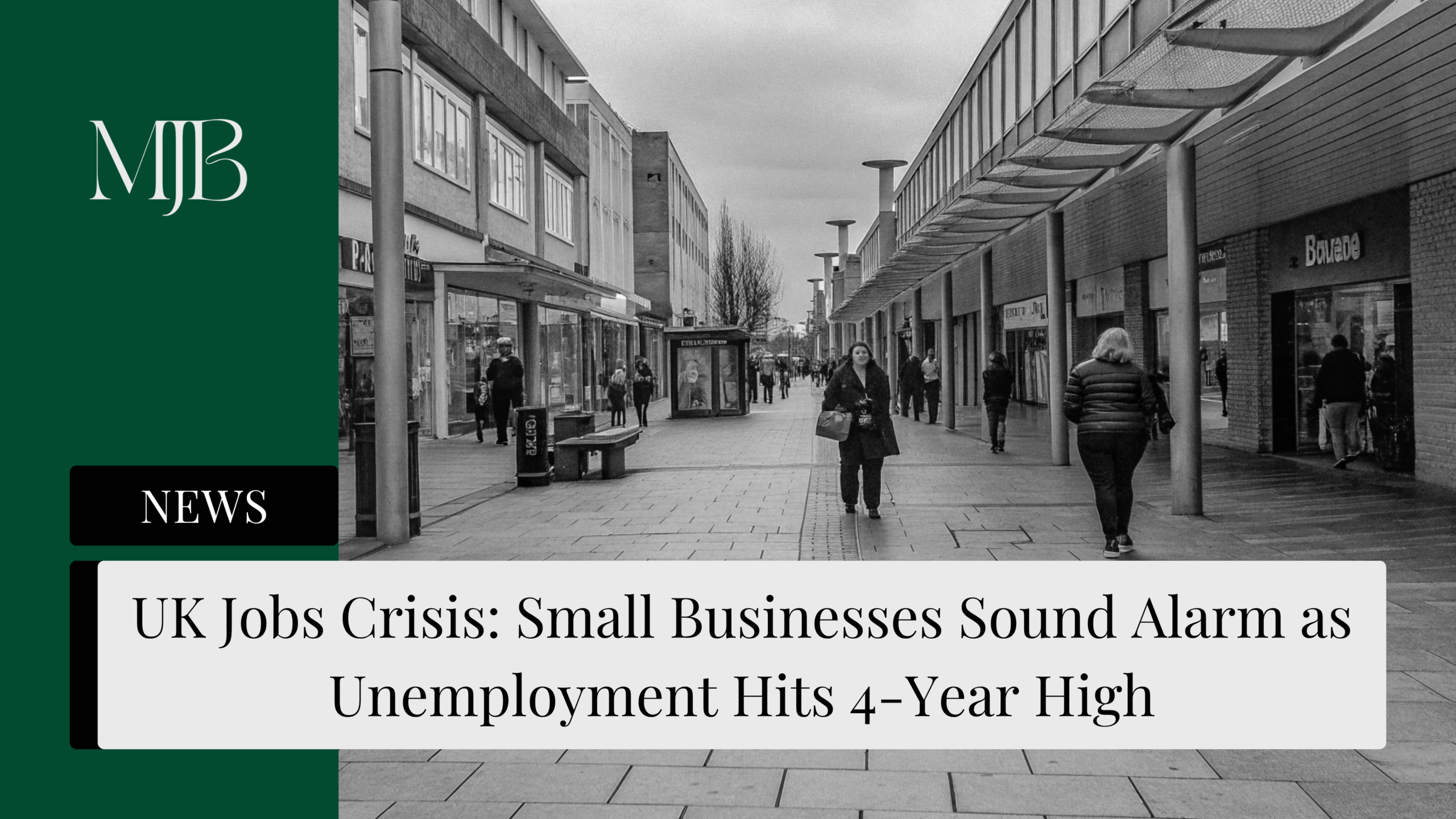Introduction
Here’s a sobering stat: UK unemployment just hit 4.7% – the highest it’s been in four years. While that might not sound catastrophic, small business owners are screaming from the rooftops that government policies are making it harder (and more expensive) to hire people. With 41,000 fewer people on payrolls last month alone and vacancy numbers falling for the 36th straight period, it’s clear something’s not working. Let’s look at why small businesses think the government has its “head in the sand” and what this means for the UK economy.
The Numbers Don’t Lie: UK Employment in Freefall
The Office for National Statistics dropped some pretty grim figures this week. Unemployment jumped from 4.4% just two months ago to 4.7% – that’s 178,000 people pushed out of work over the past year.
Job vacancies also fell by another 56,000 over three months, hitting 727,000 total. That’s 36 consecutive periods of decline. When businesses aren’t even posting jobs, you know confidence is lacking.
Small Businesses Are Bleeding Jobs – And Pointing Fingers
The Federation of Small Businesses is calling the jobs plunge “disturbing” and laying the blame squarely at the government’s feet.
Their research paints a stark picture: 20% of small businesses cut staff in Q2 2025, while only 9% added employees. Even worse? For the first time in 15 years of tracking, more small businesses expect to shrink or close (27%) than expand (25%) over the next year.
FSB chair Tina McKenzie bluntly summed it up: “If you make it more expensive and riskier to give someone a job, the result will be fewer jobs.”
Why Small Businesses Say Government Policies Are Backfiring
Small business owners are facing a storm of new costs and regulations:
Higher Employment Taxes
The government’s ramping up jobs taxes at exactly the wrong time, according to critics.
28 New Employment Regulations
The upcoming Employment Rights Bill includes measures like:
- Banning zero-hours contracts (which retailers say they need for seasonal demand)
- Ending ‘fire and rehire’ practices
- Expanding statutory sick pay
- Introducing ‘rights from day one’
Potential Pension Cost Hikes
As if that wasn’t enough, there’s talk of increasing employer pension contributions.
The message from small businesses? “We want to hire, but you’re making it impossible.”
The Employment Rights Bill: Well-Intentioned But Problematic?
Despite rising unemployment, the government’s pushing ahead with its Employment Rights Bill. The goal is protecting workers from exploitation – a noble cause. But small business owners argue the timing couldn’t be worse.
When you’re already struggling with “sky-high costs of doing business and a stagnant economy,” as McKenzie puts it, adding more regulatory burden feels like kicking businesses when they’re down.
What This Means for the UK Economy
This isn’t just about statistics – it’s about real people and communities. When small businesses (the backbone of the UK economy) are more focused on survival than growth, everyone suffers.
The writing’s on the wall: current policies aren’t creating the conditions for job growth. Something’s got to give.
Conclusion
The UK’s facing a jobs crisis, and small businesses are sounding the alarm. With unemployment at a four-year high and more businesses planning to shrink than grow, it’s clear current government policies aren’t working. The challenge now is finding the right balance between protecting workers and creating an environment where businesses actually want to hire. Time for some serious policy rethinking.
Want to stay updated on UK employment trends? Soon you’ll be able to subscribe to our newsletter for weekly economic insights.
FAQ
Q1: Why is UK unemployment rising despite government efforts to protect workers?
A: Small businesses argue that new employment taxes and regulations are making hiring more expensive and risky. When it costs more to employ someone, businesses naturally hire fewer people.
Q2: What’s in the Employment Rights Bill that’s causing concern?
A: Key measures include banning zero-hours contracts, ending fire-and-rehire practices, expanding sick pay, and introducing rights from day one. While worker-friendly, businesses say these add significant costs and complexity.
Q3: How bad is the current jobs situation compared to recent years?
A: Pretty bad. Unemployment hit 4.7% (a four-year high), job vacancies have fallen for 36 straight periods, and more small businesses expect to shrink than grow for the first time in 15 years.
Q4: Are small businesses really the key to solving this?
A: Absolutely. Small businesses employ millions of people and are typically more agile at creating jobs quickly. When they’re struggling, the whole economy feels it.
Q5: What would small businesses like to see from the government?
A: They want policies based on real-world evidence, support for making sick pay affordable, and conditions that encourage entrepreneurship rather than penalize job creation.
DISCLAIMER
Effective Date: 15th July 2025
The information provided on this website is for informational and educational purposes only and reflects the personal opinions of the author(s). It is not intended as financial, investment, tax, or legal advice.
We are not certified financial advisers. None of the content on this website constitutes a recommendation to buy, sell, or hold any financial product, asset, or service. You should not rely on any information provided here to make financial decisions.
We strongly recommend that you:
- Conduct your own research and due diligence
- Consult with a qualified financial adviser or professional before making any investment or financial decisions
While we strive to ensure that all information is accurate and up to date, we make no guarantees about the completeness, reliability, or suitability of any content on this site.
By using this website, you acknowledge and agree that we are not responsible for any financial loss, damage, or decisions made based on the content presented.






